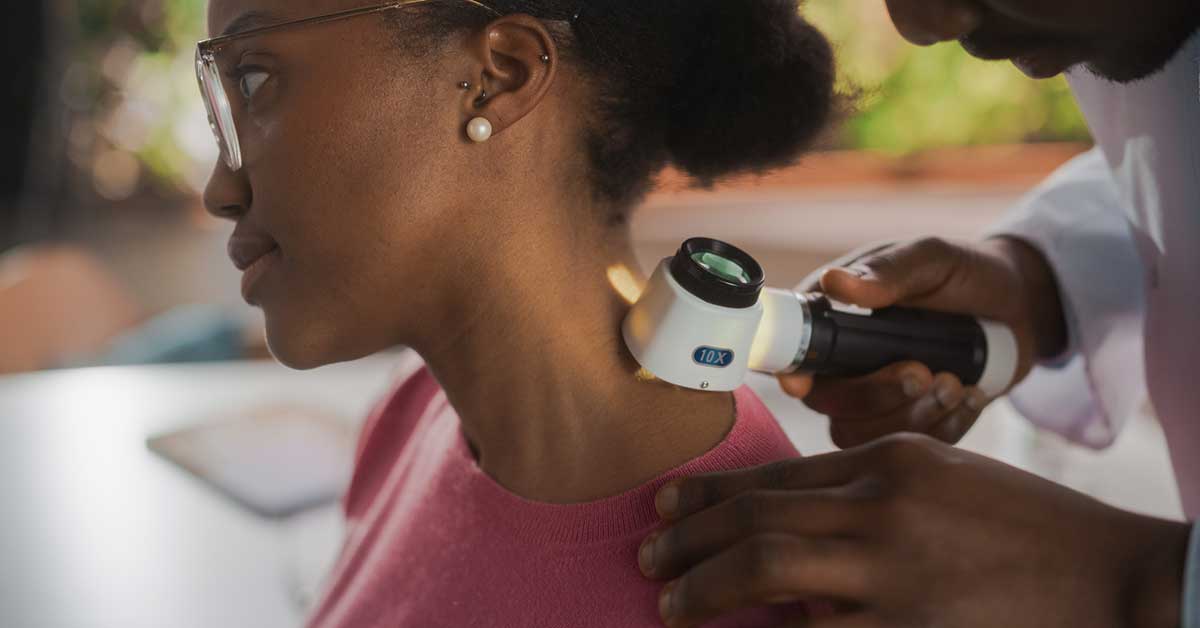Does sunscreen cause cancer?
What You Need to Know:
Few skin care products wield as much power and promise as sunscreen. It’s not just about dodging a painful sunburn; it’s your frontline shield against skin cancer, the most prevalent cancer for both men and women in the United States. But with so many options, navigating the sunscreen aisle can feel like a daunting quest. Dive into our guide to learn what you need to know to keep your skin protected all year round and why you should wear sunscreen products.
Debunking the myth: Does sunscreen cause cancer?

According to the American Cancer Society, the Food and Drug Administration has not reported that any sunscreen ingredients used in the U.S. are harmful to a person’s health. While there’s no true medical evidence linking sunscreen to skin cancer, substantial evidence underscores the risks posed by ultraviolet (UV) rays from the sun and artificial tanning beds.
Melanoma develops in cells called melanocytes, which produce melanin in our skin. Melanin gives your skin color or even the appearance of a tan. Research indicates that consistent daily application of SPF 15 sunscreen, when used properly, can lower the risk of developing squamous cell carcinoma (SCC) by approximately 40 percent and reduce the risk of melanoma by 50 percent.
Dr. Napoleon Santos, a board-certified medical oncologist and hematologist at Florida Cancer Specialists & Research Institute (FCS) in Palm Beach County, FL, recently shared that skin cancer is one of the most preventable types of cancer. Watch his interview here.
Exploring different sunscreen types
Sunscreen isn’t a one-size-fits-all solution. With many varieties available, finding the perfect match for your skin type and lifestyle can be a game-changer. From mineral to chemical, different types of sunscreen offer unique benefits tailored to various needs. Understanding these differences is crucial for choosing the right sunscreen to protect your skin effectively.
- Mineral sunscreens, known as physical sunscreens, contain ingredients like zinc oxide or titanium dioxide. They provide gentle protection, making them perfect for sensitive skin. Think of them as a soothing blanket for your skin, reflecting UV rays away.
- Chemical sunscreens, known for their lightweight formulas, are ideal for those seeking protection without a heavy feel. Ingredients like avobenzone absorb into the skin and convert UV rays that penetrate the barrier into heat.
Some argue that mineral sunscreens aren’t super effective because of their lower SPF ratings. But don’t let that deter you! These powerhouses still offer excellent protection for your skin. Tailor your choice of sunscreen to your skin type and lifestyle. It could be a lotion for everyday wear, a powdered sunscreen (a great option for your scalp) or a spray for on-the-go touch-ups. There’s a sunscreen out there for everyone!
Contact Us
Decoding the labels
Understanding sunscreen labels is crucial for ensuring adequate skin protection. Decoding these labels helps you choose a product that provides a comprehensive defense against harmful UV rays, reducing the risk of skin cancer and premature aging. Here are some answers to questions you may have while reviewing sunscreens:
Are all sunscreens broad-spectrum?
Look for broad-spectrum sunscreen to ensure you’re defended against both ultraviolet A (UVA) rays, which can lead to skin damage that causes wrinkles and sunspots to the areas that are exposed to the sun, and ultraviolet B (UVB) rays, which are more likely to cause a sunburn.
What does SPF mean?
Opt for an SPF (sun protection factor) of at least 30, as the American Academy of Dermatology recommends, and avoid being swayed by higher numbers. At a certain point, additional protection is minimal. Those who regularly use sunscreen with an SPF of 15 or higher daily can reduce the chances of developing melanoma by as much as half.
Other things to look for in a sunscreen: Water resistance is crucial for beach days or intense workouts, while active ingredients such as zinc oxide and avobenzone shield your skin from harm.
Does sunblock expire?
Keep an eye on expiration dates, too — an outdated sunscreen is about as useful as a chocolate teapot. The FDA mandates that sunscreens maintain their full strength for three years.
Can sunblock truly be waterproof?
While sunscreens can’t claim to be waterproof, they can be labeled water resistant for either 40 or 80 minutes.
Does sunblock prevent tanning?
No, sunscreen acts as a filter and cannot entirely block your skin’s exposure to the sun. Tanning is a sign of skin damage, and our skin darkens with increased melanin production. Tanning can increase your risk of skin cancer, especially without proper protection, so please consider that when partaking.
Sunscreen is your skin’s unsung hero
Consistent use of sunscreen is a crucial part of a healthy skincare routine. Don’t skimp. Apply sunscreen liberally, ensuring every inch of skin exposed to the sun gets its due. And remember, reapplication is non-negotiable, especially after a dip in the pool or a sweaty workout.
Seeking diagnosis and care for skin cancer?
Stay aware of skin cancer signs and teach loved ones the importance of using sunscreen to stay safe. FCS urges everyone to talk with their physician about the importance of sunscreen, skin cancer screenings and following recommended guidelines.





Comments